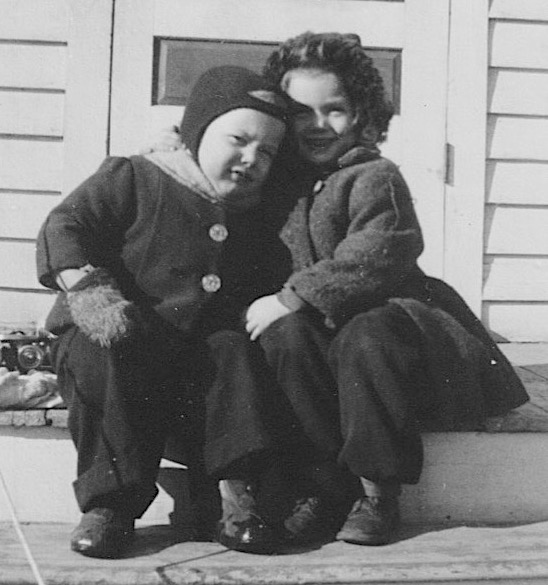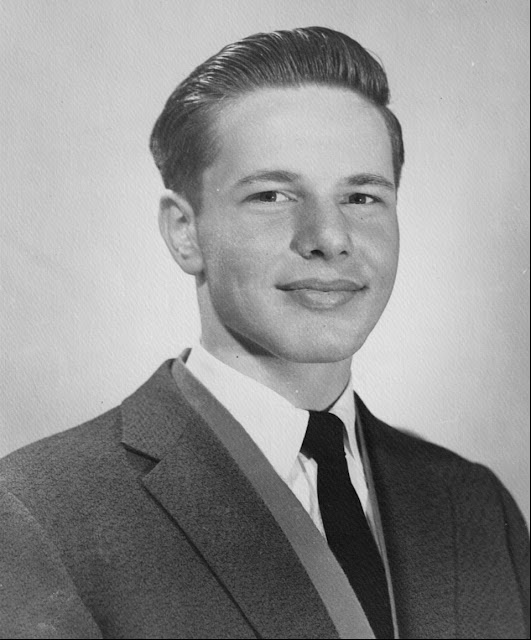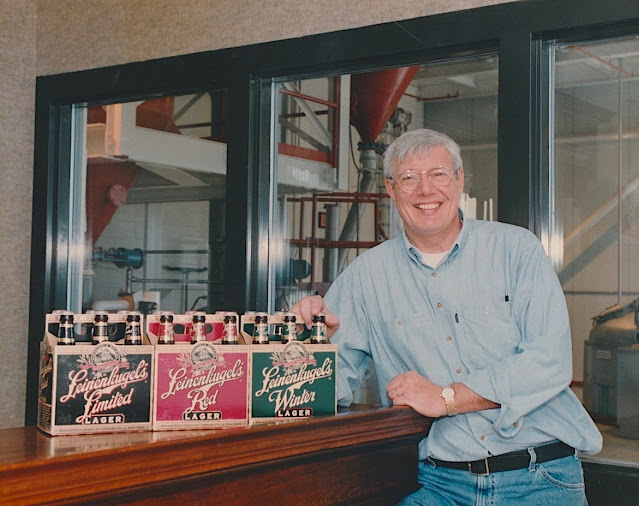 |
| Young Gary Luther with his older sister Faye. |
“The Rahr's brewery was right down the street from our first house on Eveline Street,” Luther says. “The Chief Oshkosh Brewery and the Peoples Brewery were still around then. My Uncle Ray was a brewer at Peoples. We moved over to Ninth Street when I was four. They had Peoples Beer at all the German taverns around that area, like Punky Nigl's and the Gemuchlichkeit, or the Bohmerwald on Ninth and Knapp, or the Chieftain at Ninth and Ohio. When I was 10 or 12 years old, I would go over to Leo Lang’s Midway Bar on Ninth and stock the coolers with that beer."
Luther was the second of six children and the Southside was his domain. “It was the St. Vincent parish area at that time,” he says. “It was a great neighborhood. We had friends all over the place. The Dettlaffs were our best friends. There were 17 kids in the family. All these little rascals were all over.”
 |
| Another pack of “little rascals” from the Southside. Gary Luther is at top left. |
He was schooled at St. Vincent where Luther thought he had found his calling. “I was very religious,” he says. “I was an altar boy and served every chance I could. In 8th grade I decided I wanted to become a priest and went to Sacred Heart Seminary in Oneida.” He had a change of heart three years later. “I just found it wasn't for me. I began to feel this drawing away from the priesthood.”
 |
| At Sacred Heart Seminary in Oneida, Wisconsin, 1961. |
Luther came home to Oshkosh and graduated from Lourdes High School in 1962. From there, he went to the Wisconsin State College at Oshkosh (now UW-O).
“Where I majored in going to bars,” he says grinning. “I started in pre-architecture, then switched to economics, and then to history. Finally, I said this isn’t doing me any good. After three years of college I wanted to do something with my life other than partying. I decided to go into the Military.”
The recruiter tried talking him out of it. When that didn't work, he steered Luther towards the Army Intelligence Corps. After basic training at Fort Knox, Luther joined the 511th Army Intelligence Company in Furth, Germany. "I knew how to say Ein Bier, bitte (A beer, please), but that was about it. So they sent me to an immersion school where I learned to speak German."
Luther found that life in Germany agreed with him. It was where he became acquainted with his wife-to-be. "I met Marianna in Bayreuth. I was still in the military. We had to wait to get married or they would have pulled my top-secret clearance. I knew if we waited until just before my discharge there would be no problem. So we married in November and I was discharged in February 1969."
He also knew what he wanted to do next. Luther had gotten to know the technical director for the EKU Brewery in Kulmbach, Germany. "I asked him how you became a brewer. He was from a brewing family. He explained it all to me. I said, I gotta do this."
Luther spent the next six months working at Bavarian breweries in Kulmbach and Bayreuth. The practical experience helped him gain entry to the Munich Technical University’s prestigious brewing school at Weihenstephan. Luther's training there came under the auspices of the Reinheitsgebot, the Bavarian purity law that limits brewers to the use of just four ingredients: barley malt, hops, water, and yeast. He soon arrived at a place where rules like that meant nothing.
He also knew what he wanted to do next. Luther had gotten to know the technical director for the EKU Brewery in Kulmbach, Germany. "I asked him how you became a brewer. He was from a brewing family. He explained it all to me. I said, I gotta do this."
Luther spent the next six months working at Bavarian breweries in Kulmbach and Bayreuth. The practical experience helped him gain entry to the Munich Technical University’s prestigious brewing school at Weihenstephan. Luther's training there came under the auspices of the Reinheitsgebot, the Bavarian purity law that limits brewers to the use of just four ingredients: barley malt, hops, water, and yeast. He soon arrived at a place where rules like that meant nothing.
Luther graduated from Weihenstephan in November 1973, and two months later was on his way to the Antarctica Brewery in São Paulo, Brazil. "Where we used sugar, we used corn, we used rice, we used starch... you adapt to it very fast."
 |
| Luther on his way to Brazil in 1974. |
The beer was good. São Paulo was not. "It was not a pretty city at that time. We had an apartment across from the brewery. Marianna hated being there. So they gave me a brewery called Polar in southern Brazil. We got down there and there was nothing to rent. I put Marianna on an airplane back to Germany and I stayed in a hotel."
The situation was untenable. "I was going back to Germany and on the way back, I visited my parents in Oshkosh, and my buddies in Milwaukee. I stopped by Schlitz and Pabst and Miller. Miller was going like gangbusters. Miller Lite had just gotten on the market. They said, what if we want to hire you? I gave them my number and got on the plane. When I came into the house Marianna said a company named Miller called."
The Luthers headed for Wisconsin. "I started at Miller in January 1976 and said, this is it, we're going to be happy here for the rest of our lives.” Six months later he was sent to New York. After the launch of Miller's Fulton, New York brewery, Luther went to Eden, North Carolina to set-up a new brewery there. "We were growing like crazy. We went from 12 million barrels a year to 24 million barrels just like that. We were running 500-barrel brew kettles and making 48 brews a day, seven days a week."
 |
| The Miller brewery at Fulton, New York. |
The Luthers were flourishing, as well. Gary and Marianna now had two daughters. The family found their way home to Wisconsin after Miller called Gary back to Milwaukee. As his role with the brewery continued to expand, Luther helped pilot Miller’s initial foray into craft beer. The initiative included the extension of the Leinenkugel’s brand acquired by Miller in 1987.
 |
| At the Leinenkugel’s innovation brewery on 10th Street in Milwaukee. |
"At one point, I went over to England and talked with Charlie Bamforth and told him I needed some top-fermenting yeast. He gave me four nice tubes. He said this is the Bass yeast, you'll be happy with that. I went back and formulated the Reserve Amber Ale. It was a delicious beer, but when you’re making that in Milwaukee, you’re making 500 barrels of it. That was just too much."
Luther remained with Miller until his retirement in 2000. The brewery was at its peak then producing nearly 50 million barrels of beer annually. Miller had become the largest brewery ever based in Wisconsin. And Gary Luther was Principal Brewer.
 |
| Marianna and Gary Luther. |
He didn't leave the beer world behind him. Since retiring, Luther has consulted for breweries both at home and abroad. And he devotes significant time to preserving the heritage that has informed his life. He’s active in Wisconsin’s German-American community taking part in choral groups and recording the oral histories of German-born Americans.
Luther was also instrumental in creating the ongoing Brewing Experience program at Old World Wisconsin where visitors step into the world of an 1860s Wisconsin brewery. "We actually started talking about that around 2003. We were starting from nothing, just like the Germans did when they came over here. They were doing small volumes and working with what was available to them. So we did that, we started a hop garden, and barley field, we had wooden vessels. It was authentic. It was a lot of fun."
 |
| Making beer at Old World Wisconsin. Luther is on the right wearing the green vest. |
The Luthers now have five grandchildren and divide their time between their home near Milwaukee and a home in Bavaria. That's a long way for a Southside kid who used to fill tavern coolers with Oshkosh beer. The journey has had a significance all its own.
Gary Luther came of age amid a legacy initiated by immigrants who transported their beer culture to Wisconsin from Germany. He went back to the source to become a brewer himself. Meanwhile, the breweries of his hometown were washed away in a tide of beer let loose by industrial-sized breweries. Luther rose to the top of his profession at just such a brewery. He has spanned the breadth of American brewing.









Such a wonderful story! Nicely done Lee!
ReplyDeleteThanks so much, I'm glad you liked it!
DeleteGreat story! Love my Miller high life.
ReplyDeleteProst!
DeleteWhat a great article, thank you Lee! I love the pictures too! Julie
ReplyDeleteThanks Julie, I'm glad you saw this!
DeleteHaving known Gary for several years this is his essence. Once dedicated to a project he follows through. Great article Lee.
ReplyDeleteThanks Darrell, those were some enjoyable conversations at the breakfast table in Germany.
DeleteThanks! What a pleasure it was to have you and Denise on the European Brewery and Museum Tour! You are to be commended for your writing and interviewing skills.
ReplyDeleteGary, the pleasure was all ours, we had a wonderful time. I'll never forget our long talks after breakfast. Thanks for being so generous with your time!
Delete